THE PIÑATA BOBBED UP AND DOWN in the Spartan Stadium parking lot, a papier-mâché likeness of Landon Donovan absorbing blow after blow from baseball-bat wielding children clad in San Jose Earthquakes gear.
With their parents watching on and tailgating supporters offering encouragement between swigs of their beers, the youngsters took turns battering their former hero, each swing of the bat one closer to the final connection that would split the shell open and spill candy onto the asphalt.
John Jussen, a second-generation Earthquakes season-ticket holder, kept an eye on his sons, among those gathered for the impending payoff. Jussen had been a nine-year-old himself in 1974 when the Earthquakes played their first match at Spartan Stadium. His parents, soccer-mad immigrants from Holland, found a permanent home in Section C, Row 5, Seats 1-4.
He’d followed their lead 22 years later and purchased his own season tickets when the Earthquakes, then the Clash, were reborn in Major League Soccer, eventually raising his two boys, Ray and Kevin, in the stands alongside the Ultras and the Casbah. Jussen was a lifer, and like many in the parking lot on June 25, 2005, he was angry.
After four years and two MLS Cup championships in San Jose, Donovan – easily the most talented and marketable American soccer star at the time and arguably ever – was the object of their ire as he prepared to show his face at Spartan Stadium for the first time following a series of moves that saw him depart San Jose for the Bundesliga in November then engineer a move back to MLS just four months later.
Only Donovan didn’t return to the Quakes. Instead, he found his way home to their archrivals in Los Angeles just as San Jose’s very existence as a soccer club was in question. It was a turn of events that struck Quakes fans as, at best, convenient timing for the LA-born and bred Donovan, and, at worst, a complete betrayal.
As tensions rose and kickoff approached, Jussen watched as the bat connected squarely with the piñata’s torso, and the children sprang into action. Most pounced on the candy, but Ray, seven years old at the time, scooped up Donovan’s head, a souvenir memorialized by the San Jose Mercury News in a photograph that ran on the front of the sports section the next day.
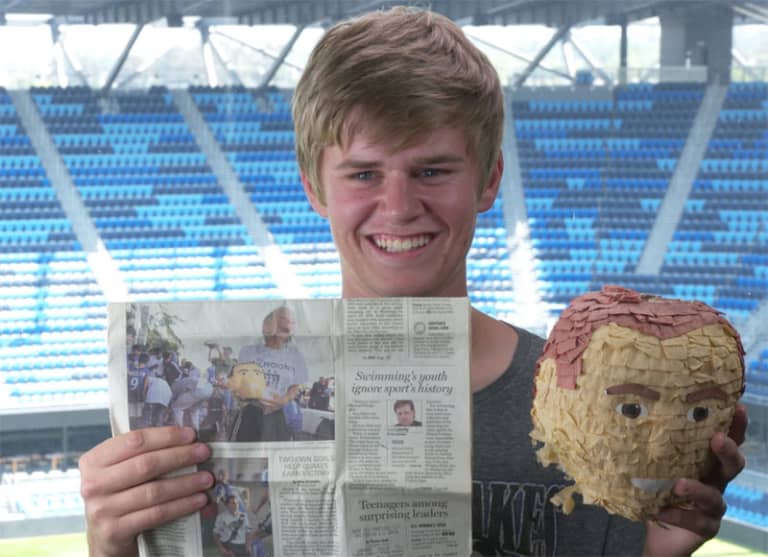
Ray Jussen poses with the head of the piñata Quakes fans battered in the Spartan Stadium parking lot ahead of the Landon Donovan's first game back in San Jose after swapping NorCal for SoCal by signing with the Galaxy. Jussen and his father, John, and brother, Kevin, usually sit in the supporters' section at Avaya stadium. Each brother still has a Donovan jersey on the wall in their rooms.
Eleven years later, including a painful two-year hiatus following that 2005 season, the Jussens still have their season tickets – as well as the now-infamous memento that’s lived on the top shelf of a closet for more than a decade, brought out occasionally during the holidays to be perched atop the family Christmas tree in lieu of a star.
Jussen still has hard feelings, too. Landon Donovan may be the best player Major League Soccer and the US national team has ever seen, he may have helped deliver the only MLS Cup championships in San Jose’s history, but for many Quakes fans, he remains persona non grata, his complex California Clásico legacy marked by adoration in LA and antipathy up the coast.
“It’s still scars. It’s not healed at all,” Jussen says. “Maybe time heals old wounds, but it hasn’t been addressed, this particular incident.
“I personally feel," he adds, "that if Landon Donovan stayed with San Jose and said, ‘I believe in this city and I believe in this club. They shouldn’t move the club. I want to stay here,’ that the franchise would not have moved.”
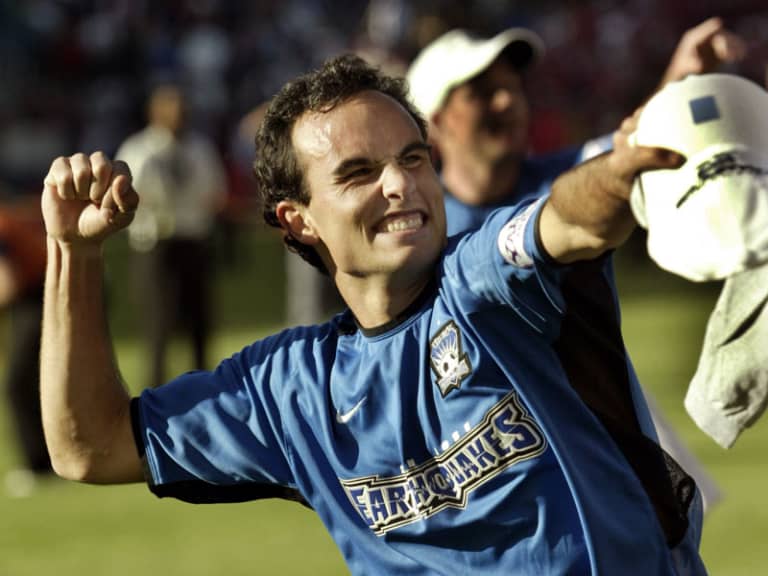
Donovan was a teenager desperate to play when he asked his agent to explore a move to MLS in early 2001. As the worst team in the league in 2000, San Jose sat atop the allocation order and wasted no time claiming the recent United States national team debutante. The move paid immediate dividends as Donovan led the club to its first MLS Cup championship in 2001 and second two years later. Photo via Reuters
DONOVAN HAD BEEN A HOMESICK 19-YEAR-OLD plying his trade with the reserve team of German Bundesliga club Bayer Leverkusen four years earlier when he approached his agent, Richard Motzkin, with a request.
More than anything else, he wanted to play first-team soccer. The best place to do that, Donovan figured, was in Major League Soccer. Motzkin and the league went to work.
By virtue of their MLS-worst record in 2000, San Jose owned the first “allocation” spot – the allocation system, which still exists in a different form today, allows poor performing teams the first crack at select players entering the league – and had dibs on the budding prodigy who’d marked his senior national team debut with a goal against Mexico just a few months prior. The LA Galaxy were interested, too, reportedly floating trade offers that the Quakes batted away to the delight of their fans.
On March 30, 2001, Donovan signed a four-year deal with MLS. Technically, he was on loan from Leverkusen, who retained the option to recall him after one year should a first-team place open up in Germany. An avowed “SoCal guy,” Donovan was headed to the Bay Area for just the second time since a school trip years prior.
“When they said San Jose, I didn’t even know how far that was from LA,” Donovan remembers. “Honestly, I didn’t know much about the league.”
He arrived as the final piece of a rebuilding project led by first-year head coach Frank Yallop that included the offseason additions of internationals Dwayne De Rosario, Jeff Agoos and Ronnie Ekelund. Eight days after signing with the Quakes, Donovan made his first appearance, fittingly against the Galaxy. His first goal came a little more than a month later in a 2-0 home win against the MetroStars in front of 6,879 fans.
“When we saw him play, we knew that he was special,” Jussen says. “He was our guy that nobody could take away from us. We had some rough years before he showed up. When he came, basically it changed the course of the franchise.”
The Quakes finished 2001 in second place in the Western Division, just two points behind the Galaxy. Donovan chipped in seven goals and 10 assists, then put San Jose on his back in the playoffs, scoring five goals and assisting on two more to lead the upstart franchise to their first MLS Cup triumph, secured via a 2-1 victory in Columbus against – who else? – the Galaxy.
“It was a real good team that Frank put together, but the winning formula was nothing without Landon,” says current San Jose head coach Dominic Kinnear, who was an assistant in 2001 and counts Donovan’s playoff run as the best vein of form he’s ever seen in MLS.
Donovan would go on to score 42 goals and add 35 assists in 101 regular season and playoff games for the Quakes including a combined three goals in the 2001 and 2003 MLS Cup wins. “The Landon Donovan Era” in San Jose transformed the club from perpetual also-rans into one of the best teams in MLS history.
In the process, Donovan had grown into US soccer’s unquestioned front man on and off the field, a point of considerable pride for a fanbase still battling an inferiority complex from years of what they viewed as second-class treatment by then-owners AEG, who also operated the hated Galaxy.
He made 56 US national team appearances during his four years with the Quakes. One day after losing to Germany in a 2002 World Cup quarterfinal, Donovan boarded a red-eye flight from Ulsan, South Korea, to San Jose, making it back in time to take the field to rapturous applause as a late substitute in a 4-0 home win against the Colorado Rapids.
“He came back from the World Cup a conquering hero,” Jussen recalls. “We knew we had the best player in the United States.”
“It put the San Jose Earthquakes on the map in the Bay Area and in MLS,” Kinnear says. “All on a 19-, 20-, 21-year-old’s shoulders, and he handled it so well. He got pulled in a lot of different directions. Everybody wanted something of him.”
And while his family and friends in Los Angeles still occasionally pulled him south – Donovan flew back to visit after matches, boarding 6 am flights on Monday and Tuesday mornings to make it back in time for training – he made his home in Northern California during what he calls “four of the best years of my life.”
“I considered myself a Bay Area person. I really fell in love with it,” he says. “It was green, the weather was beautiful, the people were friendly and happy. I became loyal to it because this was the place that gave me my chance to play and to succeed as a soccer player.”
San Jose wasn’t, however, a place Donovan planned on staying forever. In the winter of 2004, with his four-year loan deal coming to an end, it was time to prove he could hack it in the Bundesliga at Bayer Leverkusen – this time as an accomplished 22-year-old star.
“All the fans knew, deep down in our hearts, that we weren’t going to be able to hold on to him forever,” Jussen remembers. “That he was so good that he was going to go to Europe and conquer Europe and say, ‘I got my start in San Jose.’ We all knew San Jose was a stepping stone for him.”
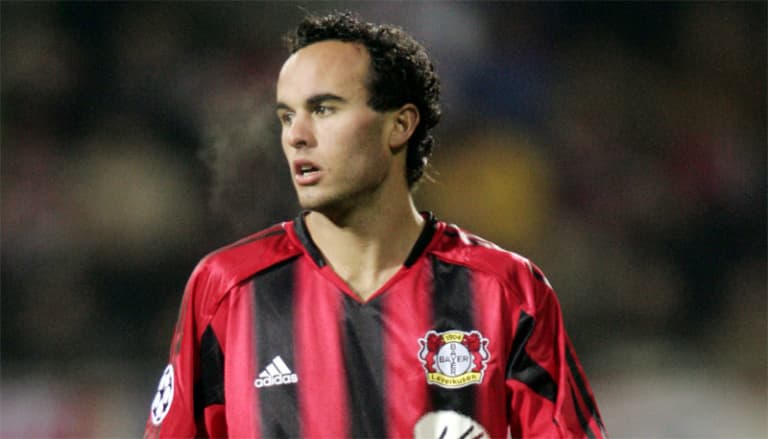
One of the final straws at Bayer Leverkusen came when Donovan was substituted after 51 minutes of a Champions League match against Liverpool. At the time, the early hook made Donovan feel like a scapegoat. Looking back, he says the criticism was warranted: "When I look back honestly from 10,000 feet, I had a horrible game. I deserved to be pulled." Photo via Reuters
ALMOST IMMEDIATELY, DONOVAN COULD FEEL IT IN HIS GUT. Something wasn’t right. It was his second go-round in Germany and he still wasn’t getting regular playing time. He wasn’t happy.
The United States was where his career was, where his family and friends were, where he could be near girlfriend and future (now former) wife, Bianca Kajlich. MLS had become home. For the second time, he decided to walk away from Bayer Leverkusen in the pursuit of happiness – and playing time.
“My problem then was I didn’t have anyone telling me, ‘It’s going to be hard, just keep going and keep learning. It’s going to be OK,’” Donovan says. “My reaction was to flee. Fight or flight, and I decided flight. In retrospect, I think that was a weak decision on my part.”
Just three months, seven games and two starts into his second stint with Leverkusen, Donovan sat in a hotel lobby and, in German, attempted to explain to manager Klaus Augenthaler why he could not possibly resist the siren song of home and continue with the club.
“I’m not sure how much he understood,” Donovan says. “At the end, he looked at me and said, ‘OK, if that’s the decision you want and that’s where you’ll be happier, I’m OK with it.’ I called [my agent Rich Motzkin] and said, ‘I think I got the go ahead. Let’s try to find a way to make it work.’”
Though memories are hazy and the nearly 12 years that have since elapsed have made tracking down the finer points difficult, Donovan, Motzkin and the league ultimately made it work with Leverkusen. A third loan move was briefly rumored, but MLS instead stepped up and paid the Bundesliga club $3.5 million for Donovan's rights before the transfer window closed.
AEG CEO Tim Leiweke, who at the time oversaw both the Galaxy and the Earthquakes, did the rest. Leiweke dangled Donovan‘s dream move in front of him. He didn't have to do much convincing. With the Quakes rumored to be relocating to Houston – a non-starter for Donovan – he could return home to Southern California to be near his family, friends and soon-to-be fiancée. He could be the face of the Galaxy – and MLS.
Donovan was sold and all that was left was for LA general manager Doug Hamilton to strike a deal with FC Dallas, the club that had finished at the bottom of the 2004 league standings and thus held the top spot in the allocation pecking order for returning national team players. But to do so, the Galaxy GM would have to give up arguably MLS’s most potent goalscorer, Carlos ‘El Pescadito’ Ruiz, who had led LA to their first MLS Cup in 2002 and was a star in his own right. Hamilton pulled the trigger.
“Carlos Ruiz was not happy,” says then Galaxy head coach Steve Sampson. “… Quite frankly, I think he got what he considered the raw end of the deal.”
Quakes fans felt the same way. The fact that AEG owned both franchises led some supporters to wonder whether rules had been bent to ensure Donovan's final destination would be to their archrivals in Los Angeles.
Fueling the suspicions at the time were reports claiming the Quakes had lost their right to Donovan in a January 2005 trade for Ricardo Clark due to the exchange of replacement allocation money which San Jose had received in lieu of Donovan’s departure just a few months before. When MLS’s 2005 player rules were released in March 2005, they included an addendum that specified if any or all of a replacement allocation was traded, that club would no longer hold the right of first refusal should that player return to MLS.
However it happened, the entire transaction didn’t go down well with Quakes fans.
“[Quakes fans felt] right away that, ‘Hey, this is not playing by the rules. This is some sort of end around,’” Jussen says. “Obviously the fans weren’t happy about that.”
General manager Alexi Lalas, who’d long since resigned himself to the fact that the league’s poster boy would never return to San Jose, received much of the blame. Supporters pointed to Donovan's move and the Houston relocation rumors as proof in their minds that Lalas was merely doing AEG's bidding to the detriment of professional soccer in the Bay Area.
“I did everything in my power to protect the San Jose Earthquakes because ultimately that was my responsibility,” Lalas says, acknowledging it was also his job to begin the transition from San Jose to Houston. “But I did it with the knowledge that the Donovan ship had sailed. I felt it was a fait accompli.”
“I took the big picture on that one. What’s the best for MLS?” Kinnear, by then the Quakes' head coach, remembers. “Yes, obviously I wanted Landon to come back to the San Jose Earthquakes because he meant a lot to the team, but for the long-term future of the league, if him going to LA made it better for everybody, then I’ll take a step back and accept it.”
Donovan was now a Galaxy player, a fact that even the LA locker room had difficulty processing.
“We were parting with a significant piece of our franchise [Ruiz was 2002 MLS MVP and Golden Boot winner in 2002 and 2003] for probably arch enemy No. 1 at the time,” remembers Pete Vagenas, then Galaxy captain and currently LA’s vice president of soccer operations. “… When [Landon] first got here, it was jarring. And it was jarring for everybody.”
Donovan remembers it a little bit differently. His new beach-front life in Los Angeles with Kajlich and his dogs while surrounded by family and friends felt like “ecstasy.” He was the highest-paid player in the league, finally living the lifestyle he wanted in the city he called home.
“It was the ideal situation for me,” he says. “I didn’t understand big picture what it meant for the league.”
He didn’t fully understand what it meant to Earthquakes fans, either.
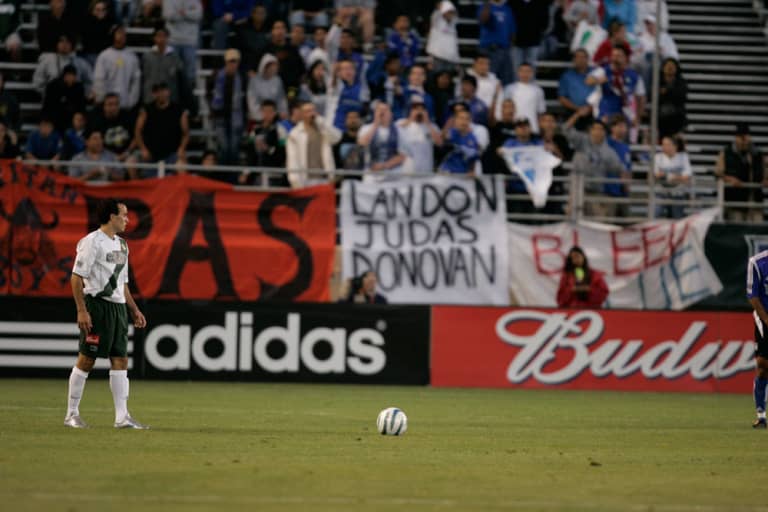
Donovan may have given them four wonderful years, but San Jose Earthquakes fans didn't hold back when the new face of the LA Galaxy took the field at Spartan Stadium on June 25, 2005. The stands were dotted with signs proclaiming Donovan a traitor, quitter, PrimaDonovan and even Judas, the latter of which fell on deaf ears: "At the time, I didn't know what it meant. I had to look it up." Photo via San Jose Earthquakes
FOR THREE MONTHS, SAN JOSE FANS STEWED. For three months, they grappled with the fact that their team, arguably the best in MLS, likely would not be theirs past 2005. For three months, their frustrations coalesced around the “traitor” who they felt had abandoned them in their time of greatest need.
In late June, when Donovan stepped off the Galaxy bus in San Jose and made his way into the lobby of the visitors’ hotel, it quickly became clear that Quakes fans would be anything but friendly on his first trip back.
“I heard a horn beep and somebody said, ‘Hey, Donovan,’” the US national team’s all-time leading scorer remembers. “I looked over and started to wave and he [gave me the middle finger] and went, ‘[Screw] you.’ And I went, ‘Whoa.’”
It only got worse when the Galaxy arrived at Spartan Stadium. In the parking lot, Jussen and the rest of San Jose’s hard-core supporters prepared to make their voices heard on the ESPN broadcast.
Signs were prepared, Quakes jerseys bearing Donovan’s name defaced and his piñata likeness, an effigy of sorts, whacked enthusiastically by their children. On the way from the team bus to the locker room – an exposed route at Spartan Stadium – the jeers penetrated Donovan’s headphones. The hatred was palpable.
“There was a pressure to let him know how unhappy we were,” Jussen remembers. “We all had our own levels of unhappiness.”
Donovan felt that anger, literally, as he made his way back up the tunnel after warmups. Laying in wait, a fan balled up a t-shirt and tied it together into an improvised projectile. Caught unaware, Donovan was struck directly in the face.
“He hit me as well as he could hit me. Just nailed me. That set the tone,” Donovan recalls. “… It hit me that I’m not this beloved, everything’s OK, hunky dory athlete anymore.”
Kickoff took the acrimony to another level. He was branded a traitor and a quitter in signs that depicted him as Landon “Judas” Donovan, PrimaDonovan and Benedict Arnold, complete with a noose around his neck. His every touch was booed.
“Our fans let him hear it,” says Brian Ching, then a Quakes forward.
“I remember being a little disappointed with the way that he was treated after all that he had done for that team,” says then Quakes defender Eddie Robinson, who arrived in San Jose in 2001 alongside Donovan. “It reminded me a lot of the way the Dynamo were treated the first time we went back to San Jose. It was embarrassing. It almost made me want to disown my Earthquakes history.”
Clearly rattled, the Galaxy star went through the motions as the Quakes ran out to a comprehensive 3-0 win.
“It was all sort of bundled up together into this one vicious ball of energy and feeling that they had,” Donovan says. “They put it all on me, deservedly so, and it all just kind of came out.”
“I almost felt like we deserved to lose the game because of what had happened with me,” he adds. “That’s a weird thing to say, but it’s just the feeling I had.”
Quakes fans would get no more redemption. Four months later, despite dominating the Galaxy head-to-head on their way to the best record in MLS and the Supporters’ Shield, Donovan cemented his status as a Bay Area villain by putting the final nail in San Jose’s coffin. He led LA to a 5-3 aggregate-goal win in the Western Conference Semifinals on the way to the Galaxy’s second-ever MLS Cup victory.
“Put him on any team in the league, and he makes them into literally a title contender,” says Sampson. “He literally did that for the LA Galaxy. For as much success and resources the Galaxy had and has, he was that missing element.”
Meanwhile, the Quakes – 18-4-10 in their first season without Donovan, and, Kinnear contends, the best team in MLS history not to win MLS Cup – were headed to Houston and would be rebranded the Dynamo. Intentionally or not, Donovan had become the central protagonist in the California Clásico, a rivalry that would lay dormant for two years before coming back with a vengeance when the Quakes returned to San Jose in 2008.
“Landon was a huge factor in the rivalry, not only between the fans but the guys on the field,” Ching says. “I love the kid to death, but when he beat us in the playoffs that year, it definitely hurt.
“When we stepped on that field, he wasn’t a former teammate. He was a guy we were trying to beat and take down. Unfortunately for us, he had the talent to carry that Galaxy team.”
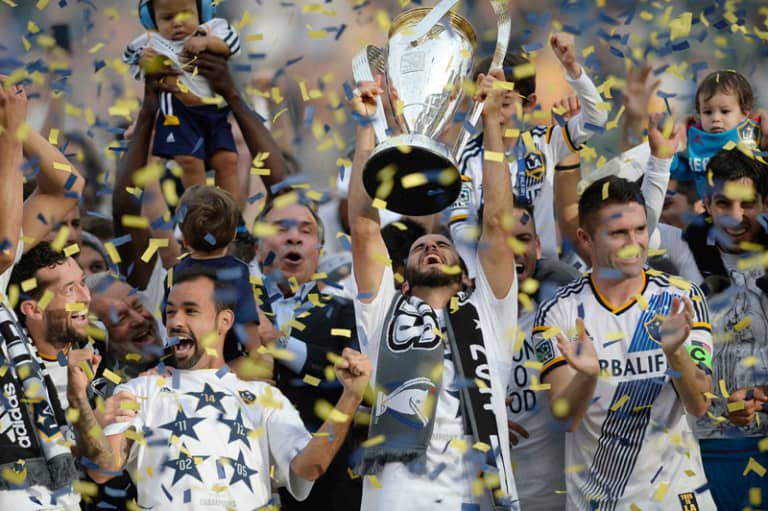
Donovan's decade with the Galaxy established him as MLS's best-ever player and the biggest American star in the history of the game. He won four MLS Cups with LA, transforming the club into a team of substance in addition to flash. In 2015, MLS renamed the trophy given to the league's top player the Landon Donovan MVP award. Photo via USA Today Sports Images
ONE OF THE FIRST IMAGES THAT GREETS VISITORS to the Galaxy’s headquarters at StubHub Center in Carson, California, is a triumphant Donovan raising his fourth and final MLS Cup for the club high above his head amidst a shower of confetti.
He retired after that 2014 season as MLS’s all-time leader in goals (144), game-winning goals (41), playoff goals (25), assists (136) and tied for the lead in playoff assists (14). He is a six-time MLS Cup champion, two-time Supporters’ Shield winner and helped LA capture the double with a US Open Cup triumph to go with their MLS Cup title in 2005. He’s a seven-time Best XI selection, and 2009 MLS Most Valuable Player.
Donovan is also, in the modern era of MLS, almost exclusively remembered as the face of the Galaxy, a club with which he remains inextricably linked in retirement, now serving as a TV analyst. That he changed the trajectory of the franchise, confirming LA as MLS’s modern superpower, is unquestioned. His legacy with the Quakes remains more complicated.
“If you were to pick a best XI for each franchise, he’s probably the first name to come off your lips for both teams. It shows you how important he was to those teams’ success,” Kinnear says. “The Galaxy were, as Alexi said then, the crown jewel of MLS, but it wasn’t until Landon got there. They had some good teams and some good players [from 1996-2004], but the level of consistency that he brought to that team – the championships, the playoff wins, the dramatic comebacks – was huge.
That Donovan and the Galaxy often did so at the expense of the Earthquakes has never escaped the attention of San Jose’s fans.
“They take it real personal over there. It stings,” says Alan Gordon, a member of LA’s 2005 championship team who spent three-and-a-half years with the Quakes as a Bash Brother-sized thorn in the Galaxy’s side before being traded back to LA in August 2014. “It’s like putting salt on the wound. Every time Landon scores or wins a championship, it’s just a reminder that they used to have Landon and were successful with Landon and now they don’t have him anymore.”
“It’s one of those things, maybe like an old girlfriend,” echoes Jussen. “You are kind of scorned and you get scarred. They say ‘Living well is the best revenge.’ We’ve tried to live well.”
In the process, relations slowly thawed between Donovan and Quakes’ supporters either unbothered or unaware of the events of 2005, though many still hold on to resentment. The club’s return to San Jose in 2008 certainly helped – “It would have been criminal for the Earthquakes not to have a team in Major League Soccer for the rest of eternity,” Donovan says – as did the construction of Avaya Stadium ahead of the 2015 season.
“I can see their side,” Donovan says. “I want them to see my side a little bit more too.”
Upon reflection, he admits there is some lingering guilt. Someday he’d like to clear the air with Earthquakes fans still holding on to anger more than a decade after the fact.
“In retrospect, it shouldn’t have happened that way, if I am being honest,” Donovan says. “I don’t think it was fair to all parties that in essence San Jose was sort of forced into this. I’m sure they would have loved to have me back.
“But when you look at it from a big picture you can understand why everyone made it happen the way they did. It was beneficial to the league, and it was the right thing to do in the end. But at the time, it wasn’t right. I should have just pushed and said, ‘You know what, the right thing to do is to go to San Jose.’”
Perhaps. But perhaps the move and the ripples that followed were exactly what MLS needed at a delicate time in league history.
“The reality is that it brought more notoriety to the league. It brought more notoriety to the rivalry between Los Angeles and San Jose,” Sampson says. “In the end, I think Landon was the one that benefited the most out of it because he demonstrated that either for San Jose or LA, he was the difference maker.”
More than a decade after he became the soccer epicenter of the cultural fissure that separates SoCal and NorCal, Donovan’s legacy in California and the Clásico lives on. Both hero and antihero, his presence will be keenly felt when the two teams take the field this weekend for yet another meeting between two rivals whose fortunes changed forever 11 years ago.
“From the San Jose perspective, I can understand people in the dead of the night waking up, when we’re at our most vulnerable and honest, and saying, ‘Did Landon really care about San Jose? Or was it always his intention to go back home?’ Lalas says. “‘Was he really one of ours?’
“It is what makes this incredible saga so interesting – the characters and personalities involved and Landon, in particular – because the mid-stream change not only changed the Galaxy and San Jose, but the entire league.”
THE WORD is MLSsoccer.com's regular long-form series focusing on the biggest topics and most intriguing personalities in North American soccer.












